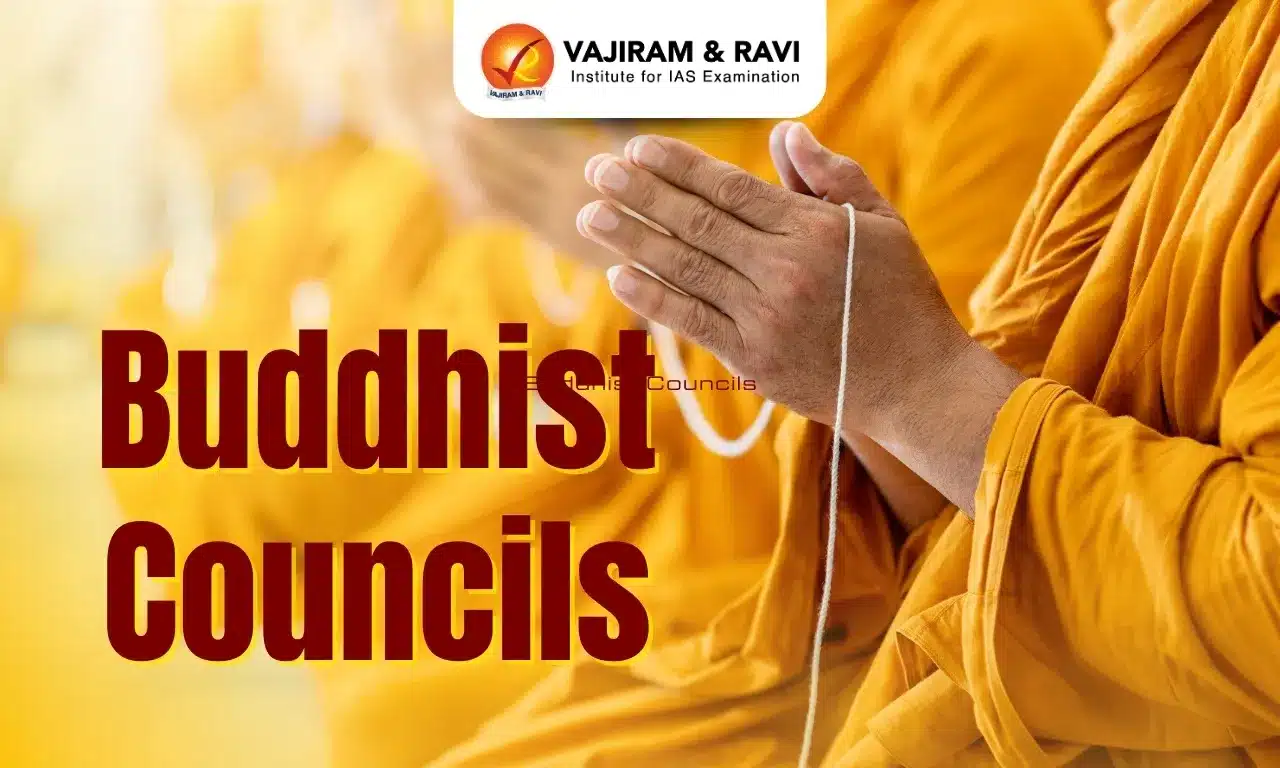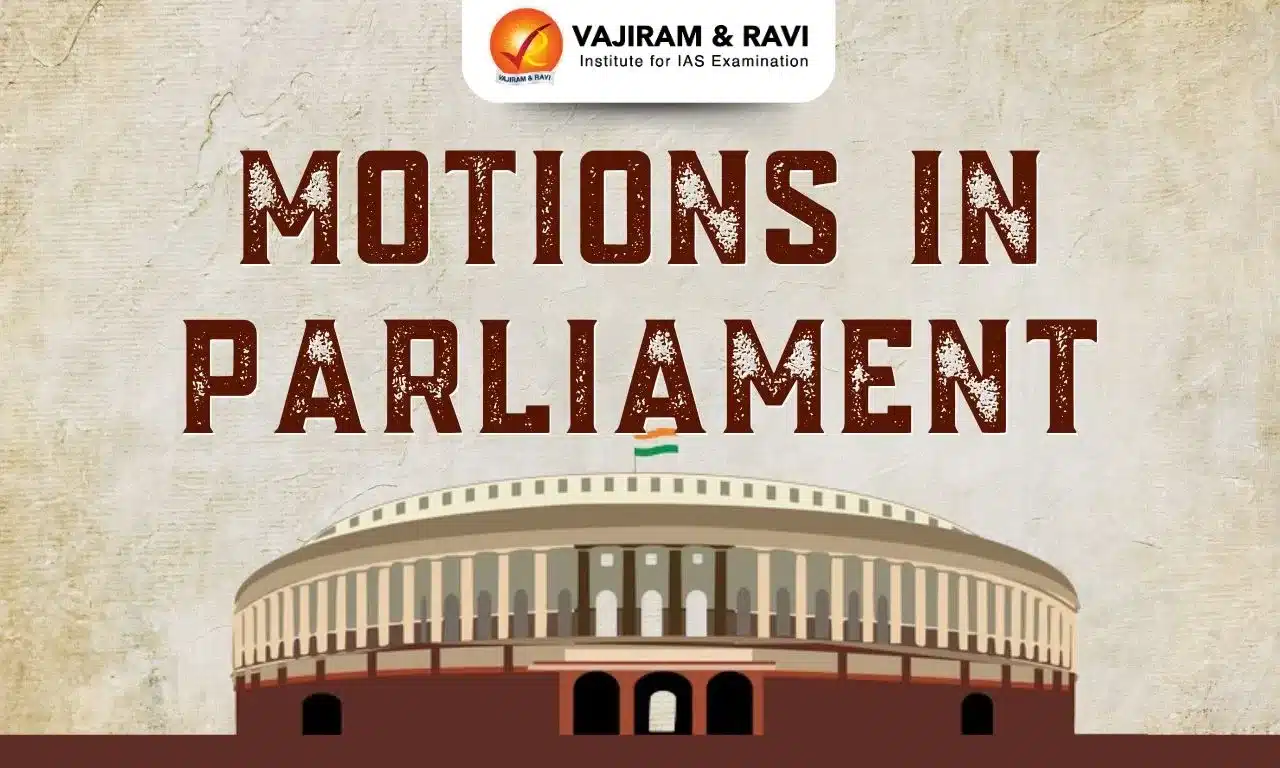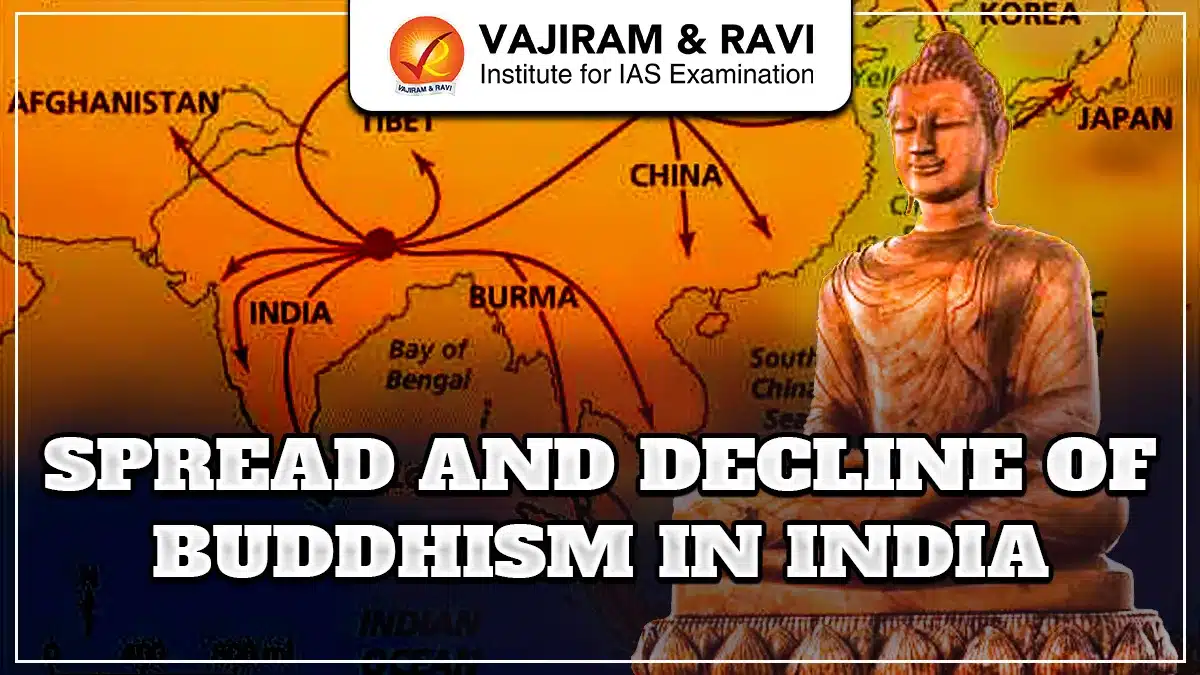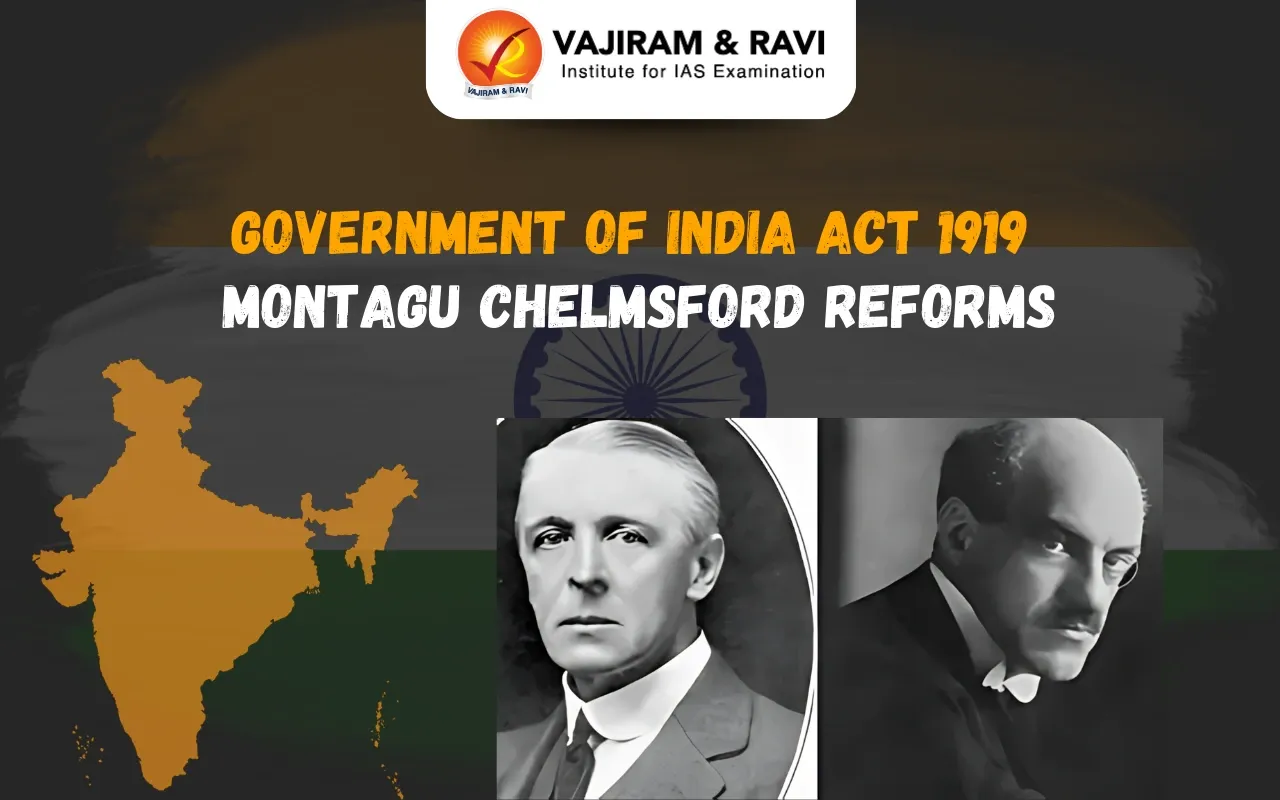Buddhism has constantly refined and evolved through conventions, various practices and councils. Over the period, Buddhist monastic communities have convened together to recite approved texts of scriptures and to settle Buddhistdoctrinal disputes. These conventions or formal gatherings are called 'Buddhist Councils'.
There were four major Buddhist Councils that were organised to institutionalise and shape the ideas and philosophy of Buddhist doctrines; the first one was immediately held after the death of Buddha.
First Buddhist Council (483 BC)
The First Buddhist Council was held in 483 B.C., after the Mahparinirvana of the Buddha, to preserve the purity of the teachings of Buddha. Various senior Buddhist scholars like Upali and Anand participated. Ananda was the reciter for Dhamma, and Upali was the reciter for the Vinaya Pitaka.
- Venue:Rajagriha (Modern Bihar)
- Patronage:Ajatashatru (Haryanka dynasty)
- President: Mahakasyapa.
- Objective: Its purpose was to maintain the purity of the teachings of the Buddha.
- Outcome: Compilation of Vinaya Pitaka and Sutta Pitaka:
- Vinaya Pitaka: It deals with the rules and regulations of the sangha or monastic order under the direction of Upali (close disciple of Buddha).
- Sutta Pitaka: It consists of various aspects of Buddha’s teachings. It was developed under the direction of Ananda.
Second Buddhist Council (383 BC)
The Second Buddhist Council was convened mainly to settle disputes about the true interpretation of the Buddha's teachings and the ‘Ten Points’ dispute regarding the relaxed rules of discipline followed by certain monks, especially the monks of Vaishali.
The ten contentious points were:
| Contentious points |
|
- Venue: Vaishali (Bihar)
- Patronage:Kalasoka (Shishunaga dynasty)
- President: Sabakami
- Objective: To settle the dispute emerging out of multiple interpretations and establish the true path of Buddha.
- Outcome: Emergence of the two different schools of thought- Sthaviravadins and Mahasamghikas.
- Sthaviravadins: It advocated strict adherence to the original tradition of Buddhism and compliance with the pure teachings of the Buddha.
- Mahasamghikas: It advocated a liberal attitude towards the rules prescribed in the Pitakas.
Third Buddhist Council (247 BC)
The Third Buddhist Council was convened by Asoka at the request of Venerable Moggalliputta Tissa.
- Venue: Paṭaliputra (modern Patna).
- Patronage:Asoka (Mourya)
- President: Moggaliputta Tissa.
- Objective: It was primarily held to eliminate corruption practices of bogus monks from Sangha.
- Outcome:
- Bhikkhu Sangha was purged of heretics and bogus bhikkhus: Those who held wrong views about the teachings of the Buddha were exposed and expelled from the Sangha immediately.
- The final version of Tripitakas was completed in this council:The last Abhidhamma Pitaka (dealt with the philosophy of Buddha )was compiled during this council. Other two were the Sutta Pitaka, the Vinaya Pitaka . They were written in the Pali language.
- The Kathavattu was composed by Moggalliputta Tissa, in which he set out to disprove the wrong opinions and theories of a number of sects.
- Theravada school: The approved teaching and philosophy of this Council term as Theravada.
- Dhamma Mission: The Asoka sent Thera monks, well versed in the Buddha's Dhamma and Vinaya, to nine different countries for the spread of Dhamma. The Dhamma missions of these monks succeeded and influenced civilisations and cultures.
Places of visits of Elder monks (Theras):
- Majjhantika Thera: Kashmir and Gandhara region (Kashmir, Afghanistan, Northwest Pakistan)
- Mahadeva Thera: Mahisamandala (Mysore)
- Rakkhita Thera: Vanavasi ( South India)
- Yonaka Dhamma Rakkitha Thera: Aparantaka (Modern Northern Gujarat)
- Mahadhamma Rakkhita Thera: Maharattha (Parts of Maharashtra around the source of Godavari)
- Maha Rakkhita Thera: Yonakaloka (Ancient Greece)
- Majjhima Thera: Himavanta Padesa Bhaga (Himalayan region)
- Sona and Uttara Theras: Suvanna Bhumi (Burma)
- Mahinda Thera : Tambapannidipa (Sri Lanka)
Fourth Buddhist Council (72 AD)
The Fourth Buddhist Council was organised on the advice of a famous Buddhist monk- Parsva. This council is famous for the formal separation of the Buddhist sangha into Hinayana and Mahayana based on sharp doctrinal differences. This council was organised under the patronage of Kanishka.
- Venue: Kashmir
- President: Vasumitra
- Asvagosha, a famous Buddhist scholar, participated in this council.
- Outcome: The emergence of Hinayana (Lesser Vehicle) and Mahayana (Greater Vehicle ) schools of Buddhism during this council.
- Vibhasha sastras: It is a compilation of the commentaries and discussion on some difficult topics discussed during the council.
Other Buddhist Council
There are two Buddhist councils organised in the contemporary period. Both councils are held in Burma (Myanmar) to commemorate and preserve the Buddha's teachings and practices.
Fifth Buddhist Council (1871 AD)
The Fifth Buddhist Council was considered to be a Burmese affair, and many other Buddhist countries were not involved in it. It is not generally recognised outside of Burma.
- Venue: Mandalay, Burma ( Myanmar),1871.
- Outcome: During this council, 729 stone slabs were engraved with Buddhist teachings.
Sixth Buddhist Council (1954 AD)
The council commemorated 2500 years of Buddhism. The entire text of the Pali Theravada canon was recited and reviewed by the assembly of monks from different countries.
- Venue: Burma at Kaba Aye, Yangoon.
- Objective: To preserve the Buddha's teachings and practices as understood in the Theravada tradition.
Various Buddhist councils served the valuable function of helping to maintain the purity of the Dhamma, which continued to flourish for more than 2,500 years. Although these councils were organised to resolve the existing differences, they can be seen as an attempt to preserve Buddha’s teachings.
Last updated on February, 2026
→ UPSC Notification 2026 is now out on the official website at upsconline.nic.in.
→ UPSC IFoS Notification 2026 is now out on the official website at upsconline.nic.in.
→ UPSC Calendar 2026 has been released.
→ Check out the latest UPSC Syllabus 2026 here.
→ Join Vajiram & Ravi’s Interview Guidance Programme for expert help to crack your final UPSC stage.
→ UPSC Mains Result 2025 is now out.
→ UPSC Prelims 2026 will be conducted on 24th May, 2026 & UPSC Mains 2026 will be conducted on 21st August 2026.
→ The UPSC Selection Process is of 3 stages-Prelims, Mains and Interview.
→ Prepare effectively with Vajiram & Ravi’s UPSC Prelims Test Series 2026 featuring full-length mock tests, detailed solutions, and performance analysis.
→ Enroll in Vajiram & Ravi’s UPSC Mains Test Series 2026 for structured answer writing practice, expert evaluation, and exam-oriented feedback.
→ Join Vajiram & Ravi’s Best UPSC Mentorship Program for personalized guidance, strategy planning, and one-to-one support from experienced mentors.
→ UPSC Result 2024 is released with latest UPSC Marksheet 2024. Check Now!
→ UPSC Toppers List 2024 is released now. Shakti Dubey is UPSC AIR 1 2024 Topper.
→ Also check Best UPSC Coaching in India
Tags: buddhist councils quest


















